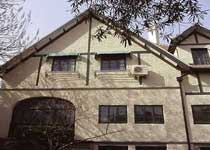Attration Category
Shanghai Weather

In October 1937, Cai Yuanpei, a renowned educationist, moved from his old residence at Yuyuanlu to Haigelu (present-day Huanshanlu). On November 2 of the same year, he took the lead to send a telegraph to the Nine Power Treaty Conference together with Li Zhaohuan, Weng Zhilong, He Bingsong and Zhu Kezhen, presidents of the Jiaotong, Tongji, Jinan and Zhejiang universities, respectively, appealing to the convention to stop Japan's aggression of China and to punish its atrocity of wantonly destroying China's cultural and educationist facilities against public international law.
Cai Yuanpei's residence is a yellow Western-style house, with a rather steep sloping roof and a dark wooden frame on the gable wall. The deep grey pebble wall and the red tile on the roof look warm and elegant. The layout of the architecture is unsymmetrical, as there is a large lawn in the south, a low small greenhouse to its left, and Sabina chinensis cv. kaizuca, plantain, podocarpus, a kind of Chinese littleleaf box and Chinese scholar trees are grown on both sides of the house. The whole building occupies an area of 2.22 mu, and the floor space is 526 square meters.
The stone staircase at the front of the house leads to the second floor. The long inner corridor leads you to its midway where there is a bronze half-leangth sculpture of Cai Yuanpei. Most of what remain in the living room were left behing by Cai Yuanpei and have basically kept their original appearance. Cai Yuanpei's works are displayed on a writing desk against the northern wall of the living room. On the left side of the southern wall hangs an oil painting by Liu Haisu decades ago. Hanging symmetrically on the right side of the wall there is a portrait painted by Cai Yuanpei's wife Zhou Jun. In the blank space of the portrait Cai Yuanpei wrote a poem, "In my move about from place to place, she is always with me no matter I'm up or down. Deeply treasured in the bottom of my heart, is the person who is the first to know my mind." The eastern room is the library where some of Cai Yuanpei's works, books and letters are preserved.
After the Japanese occupied Shanghai, Cai Yuanpei moved to Hong Kong and died of illness there in 1940. His last words were: Save the country with science, and save the nation with aesthetic education. Only when you are in his old house, can you fully understand what the self-evaluation of this profound and versatile scholar means: Never relax in self-discipline, always treat people leniently; there is nothing tolerable that I cannot tolerate, but there is something I will never let myself do; replace religion by aesthetic education, promote science to save the country; devoted to national revolution, all my actions are to achieve democratic freedom.


